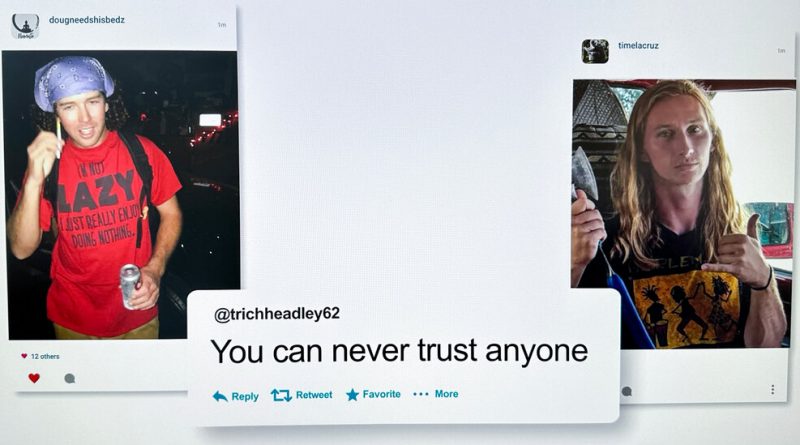Netflix Put His Photo in a True-Crime Film. Now, He’s Suing.
In 2019, Taylor Hazlewood posted a picture of himself holding a friend’s hatchet on Instagram as a tribute to his favorite childhood book, “Hatchet,” a young-adult wilderness survival novel by Gary Paulsen.
Now, that image has surfaced in a starkly different genre.
Mr. Hazlewood is suing Netflix for using his photo in “The Hatchet Wielding Hitchhiker,” a true-crime documentary about a hitchhiker turned convicted murderer. Mr. Hazlewood, a 27-year-old respiratory therapist from Kentucky, has never been convicted of a murder — let alone been associated with one — according to a lawsuit filed in District Court in Dallas last week.
He is seeking $1 million in damages for defamation and the misappropriation of his likeness..
Reached by phone on Tuesday, Mr. Hazlewood referred requests for comment to his lawyer, Angela Buchanan. In a statement, Ms. Buchanan said “there should have been no confusion” if Netflix had done “its homework.”
“Because of the lack of due diligence,” she said, “Mr. Hazlewood has a constant fear regarding the impact the film will have on his personal relationships, his employment and his reputation in general.”
It was unclear why Mr. Hazlewood, who lives in Kentucky, had filed a lawsuit in Texas against Netflix, which is based in California. Netflix declined to comment.
The Netflix documentary, which premiered in January, traces the story of Caleb Lawrence McGillvary. In February 2013, Mr. McGillvary was hitchhiking in Fresno, Calif., when a man who had picked him up struck a utility worker with his car. The driver then attacked a bystander who was trying to intervene. That’s when Mr. McGillvary took a hatchet from his bag and repeatedly hit the driver with it in the head.
An interview with a local television station briefly turned Mr. McGillvary, who identified himself only as Kai, into an internet and late night talk show hero: “Kai the Hatchet Wielding Hitchhiker.”
Three months later, Mr. McGillvary was arrested and charged with murdering a man in the man’s home near Elizabeth, N.J. Mr. McGillvary, who testified that he acted in self-defense after an attempted sexual assault, was convicted in 2019 and sentenced to 57 years in prison.
The Netflix documentary includes side-by-side images of Mr. Hazlewood and Mr. McGillvary, with a voice over that says “stone-cold killer” and the text of a tweet that says, “You can never trust anyone.”
According to the lawsuit, Mr. Hazlewood first received word about the use of the image in the film from a friend who texted him a few days after it premiered. And then another friend texted. Then another.
“Have you seen this? They put your picture up with a murderer lol” one friend wrote. “I’m shocked they didn’t ask for a release. Prayers that your employer is okay with it.”
One friend wrote that she was watching “this murder documentary and they start flashing a bunch of peoples pictures and I said that is Hazlewood.”
“Did they steal your photo?” she wrote. “How did you get on there?”
Another friend’s mother said she asked if Mr. Hazlewood and Mr. McGillvary were connected.
The lawsuit accuses Netflix of causing Mr. Hazlewood “reputational harm, stress, anxiety, and anguish,” and putting him in “constant fear of losing future employment or relationships because of people believing he is dangerous or untrustworthy.”
The use of Mr. Hazlewood’s photo is the latest example of a true-crime show cutting corners, said Bobbi Miller, who hosts a pop culture podcast called “The Afternoon Special.”
“This is a song and dance we’ve heard before,” she said. “There have been so many instances where I think for the thrill of being first and the thrill of having the most engaging story you end up not doing the journalistic due diligence of fact-checking and triangulation.”
Nathaniel Brennan, an adjunct professor of cinema studies at New York University, who teaches a class on true crime, said he was surprised that “Netflix would blunder like that” given “how much money they have invested” in true-crime series. But the rate of production may have diluted the final product, he said.
“I don’t know if Netflix would consider themselves journalists,” he said. “I don’t know if they hold themselves to a different standard.”
Source: Read Full Article


